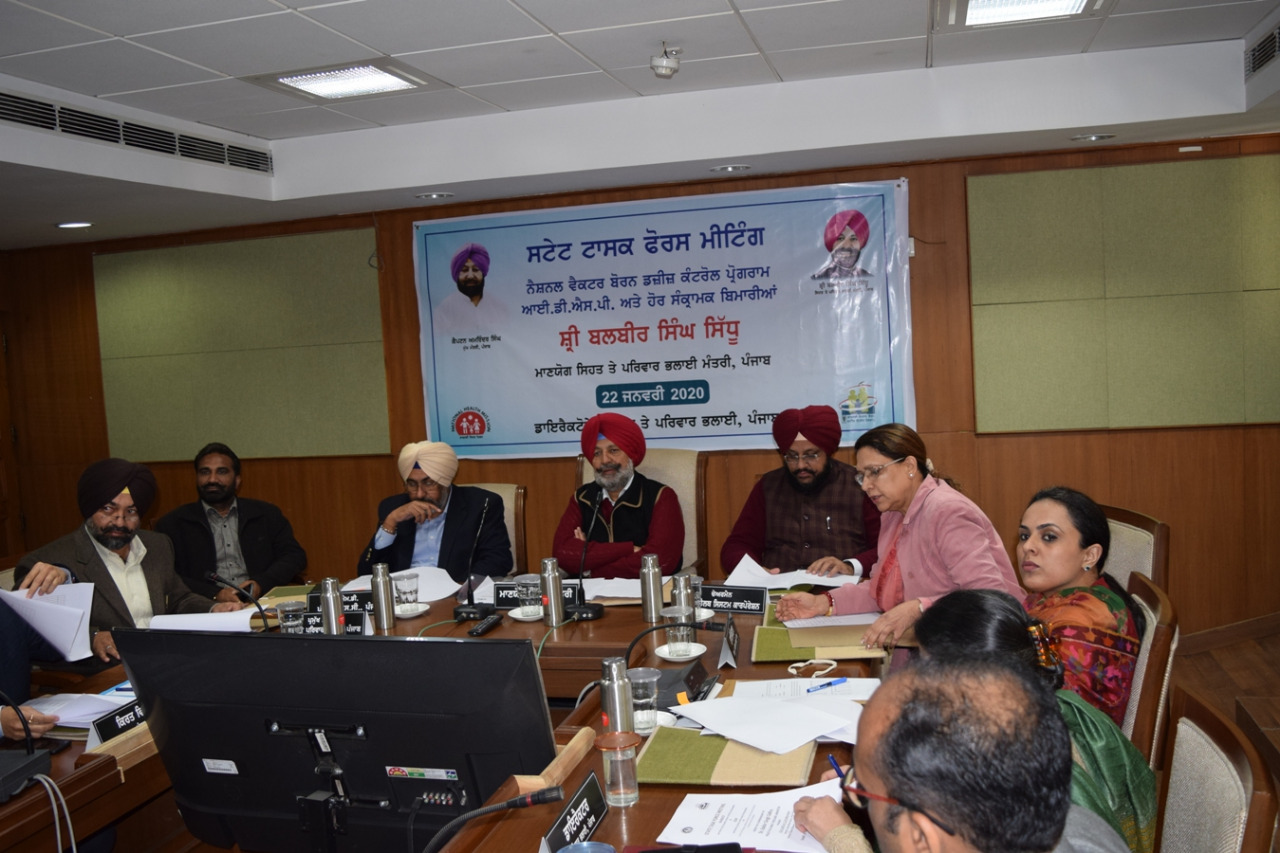Chandigarh, January 22:
To control the cases of dengue and malaria in the state, special attention need to be paid towards the high risk areas where maximum such cases are reported. The year 2019 recorded an increase of malaria cases in rural areas and 80 percent of total malaria cases were found in 4 districts – Bathinda, Hoshiarpur, Mansa and Mohali whereas urban areas of Ajnala, Batala, Fazilka & Nabha witnessed the rise of dengue cases. It was disclosed by the Health & Family Welfare department Mr. Balbir Singh Sidhu during the review meeting of State Task force for prevention and control of vector borne diseases & water borne diseases.
While presiding over the meeting, the Minister said that every department should identify a nodal officer for prevention and control of communicable diseases so that better coordination between departments could be ensured. He clarified that Health department is responsible for the testing and treatment of affected cases whereas Its the duty of Department of Local Government, Rural Development and Water Supply and sanitation to inform the health department regarding the outbreaks and take action to resolve the issue concerning to their jurisdiction.
He said that it is unfortunate that at present, Health department has been informing the all stake holder department about the outbreaks reported in their areas.
The Minister furtther asked the Rural Department to plan for man power to ensure spray of insecticides in villages across the State. He said that it is need of hour to initiate extensive campaign to make people aware about the vector borne diseases & water borne diseases in the rural as well as in remote areas so that breeding of Aedes aegypti and Aedes albopictus would be stopped at very early point.
He pointed out that challaning of offenders (place having mosquito breeding) not being done in all urban areas of the State under MC Act. He said that Urban Legislative Bodies (ULBs), all Municipal Corporations to develop and implement programme for water supply, sewerage, drainage and solid waste management to keep the environment free from vector breeding. He said that action would also be taken against those are violating the guidelines.
The Health Minister also said that seminars and IEC activities are being organized in the schools for sensitizing the children about symptoms and prevention of malaria as well as dengue. Mr. Sidhu also exhorted the Transport Department to promptly cover the used tyres as well as scrap and check on weekly basis the workshops in the Districts.
Health Minister informed that Punjab is not at high risk for Corona Virus and guidelines have already been sent to all the districts for preparedness.
At this occasion, a poster of Malaria was released for awareness of public.
On this occasion, Chairman Punjab Health System Corporation Amardeep Singh Cheema, MD Punjab Health System Corporation Manvesh Singh Sidhu, Deputy Secretary Health Dr. Amaninder Kaur Brar, Director Health Services Avneet Kaur, Director Health & Family Welfare Rita Bhardwaj, Commissioner Labor Department Mr. Praveen, Joint Director, Local Government Department Rakesh Kumar, Special Secretary, School Education Mr. Dilraj Singh, Assistant Director Fisheries Mr. Sukhwinder Singh, Joint Director Medical Edu. and Research Dr. A.D. Aggarwal, Director S.O. Health and Family Welfare, Rakesh Gupta, Deputy Director Malaria Dr. Mukesh Sodhi, Chief Engineer DWSS Rajwinder Singh, Secretary PTA Sukhwinder Kumar, Executive Engineer Water Supply and Sewerage Board Mohit Verma, Senior Regional Director Health and Family Welfare Government of India Dr. Amarjit Kaur, IMA Mohali Dr. CS Sandhu, Nodal Officer DRDP Mohali Dr. Neerja Anand and Other dignitaries were also present.

 हिंदी
हिंदी






